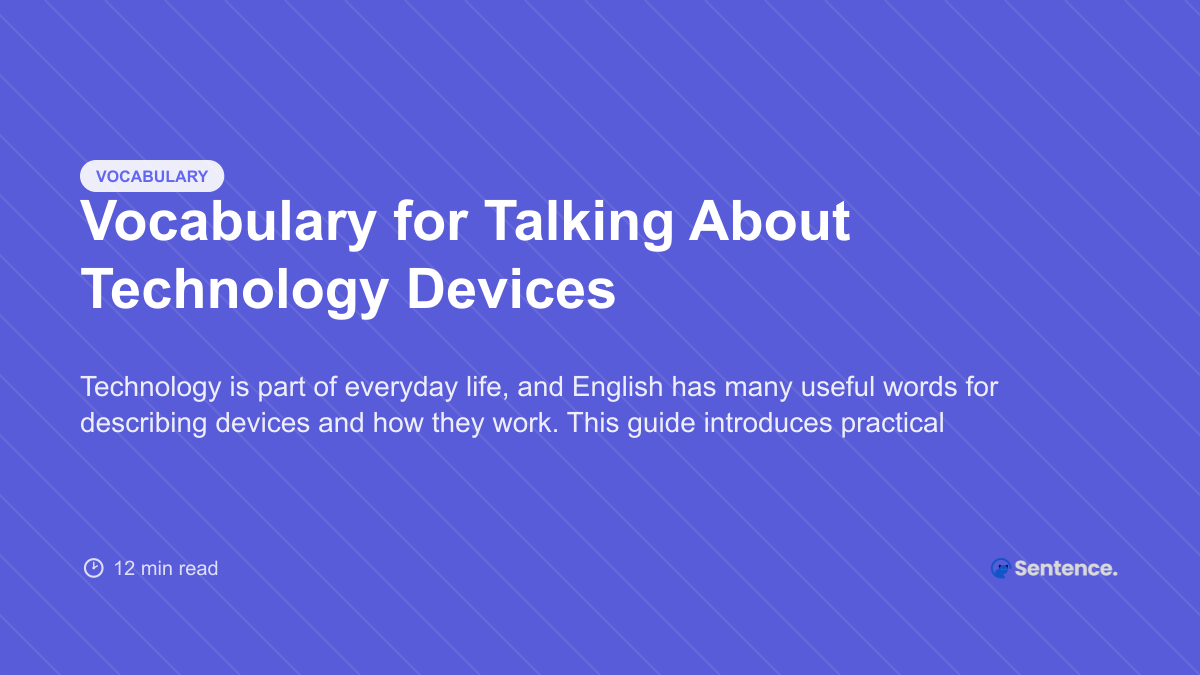Technology devices are everywhere—phones, laptops, tablets, headphones, and smart machines. Yet many learners use only basic words like “use,” “open,” or “start” when talking about them. English offers a wide range of precise vocabulary that helps you describe device functions more accurately.
This article introduces useful words for talking about technology devices. You’ll learn common verbs, adjectives, and features that appear in conversations, tech reviews, and everyday tech-related situations.
1. Common Verbs for Using Devices
These verbs describe everyday actions people take when using technology. They help you communicate clearly when giving instructions, explaining problems, or talking about device usage.
| Verb |
Meaning |
Example |
| install |
to set up software or apps |
I need to install the latest update. |
| upgrade |
to improve or move to a newer version |
She upgraded her phone last week. |
| charge |
to fill a battery with power |
Please charge your laptop before the meeting. |
| connect |
to link a device to another or to the internet |
The printer won’t connect to my computer. |
These verbs help describe basic device operations, especially when discussing apps, battery life, or internet connections.
2. Adjectives for Describing Device Features
Devices vary in performance, design, and speed, and English uses clear adjectives to describe these qualities. These words are especially useful when comparing devices or reading product reviews.
| Adjective |
Meaning |
Example |
| portable |
easy to carry |
This speaker is small and portable. |
| powerful |
strong performance |
The new laptop is extremely powerful. |
| durable |
strong and long-lasting |
These headphones are surprisingly durable. |
| high-tech |
very modern and advanced |
They bought a high-tech security system. |
These adjectives help you express how efficient, modern, or practical a device is, giving your descriptions more depth.
3. Words for Device Parts and Components
Most devices are made up of smaller components that play specific roles. Knowing the vocabulary for these parts helps you describe technical issues, ask for repairs, or understand instructions more easily.
| Noun |
Meaning |
Example |
| screen |
the display surface |
The phone’s screen cracked. |
| battery |
the part that stores power |
The battery drains quickly. |
| charger |
a device for powering batteries |
I can’t find my phone charger. |
| keyboard |
the panel with keys for typing |
This laptop has a backlit keyboard. |
These terms are essential for describing parts of phones, computers, tablets, and other common devices.
4. Words for Technology Problems and Solutions
Technology doesn’t always work perfectly, and English uses specific words to describe problems and fixes. These terms are useful in troubleshooting situations, customer support, or daily conversations.
| Word |
Meaning |
Example |
| glitch |
a small error or problem |
The app has a minor glitch. |
| freeze |
to stop responding |
The screen froze suddenly. |
| restart |
to turn off and on again |
Try restarting the device. |
| update |
to install the newest version |
The system needs an update. |
These words help you describe common tech issues and give simple instructions to solve them.
5. Make It Stick
Tech vocabulary becomes easier to remember when you connect words to real devices you use daily. Think about how often you charge your phone, update apps, or restart your computer. These simple routines help you internalize the verbs and adjectives naturally over time.
Memory Tip:
Pair each verb with a real device: install on your phone, restart your laptop, charge your headphones.
Mini Quiz
- The app won’t open because of a ___. (glitch / charger)
- Please ___ the device if it freezes. (restart / fry)
- This tablet is light and very ___. (portable / powerful)
- I need to ___ the latest version of the software. (install / sweep)
Answers: glitch / restart / portable / install
- Try this: Describe three devices you use daily using two adjectives each.
- Practice idea: Explain a tech problem you’ve had using verbs like freeze, restart, or update.
- Daily challenge: Replace general words like “do” or “make” with precise tech verbs.
⭐ Pro Tip: Using accurate tech vocabulary makes your English clearer, especially when asking for help or giving instructions.
Conclusion
English has many helpful words for talking about technology devices, from everyday actions like charging and installing to describing features and solving problems. Learning this vocabulary makes your communication clearer and more confident in tech-related situations. With regular practice, you’ll be able to describe devices and issues like a natural English speaker.
